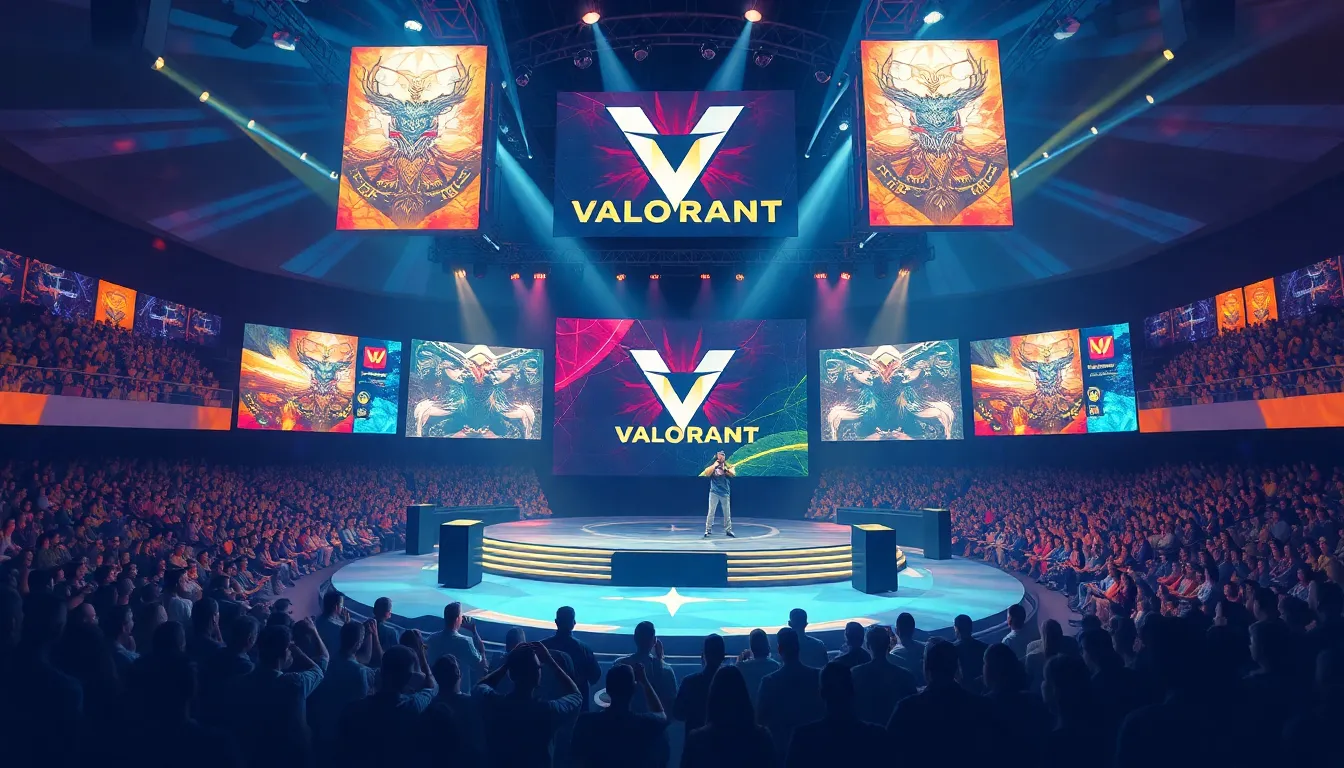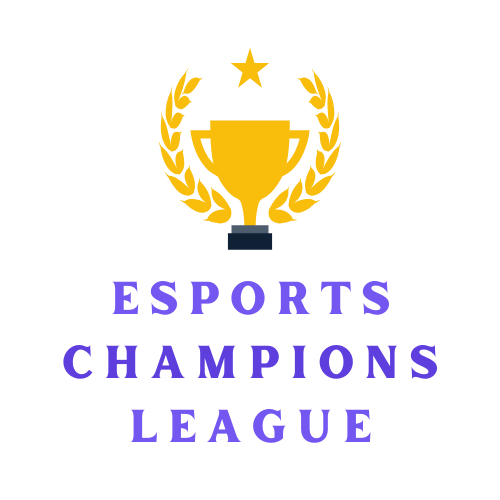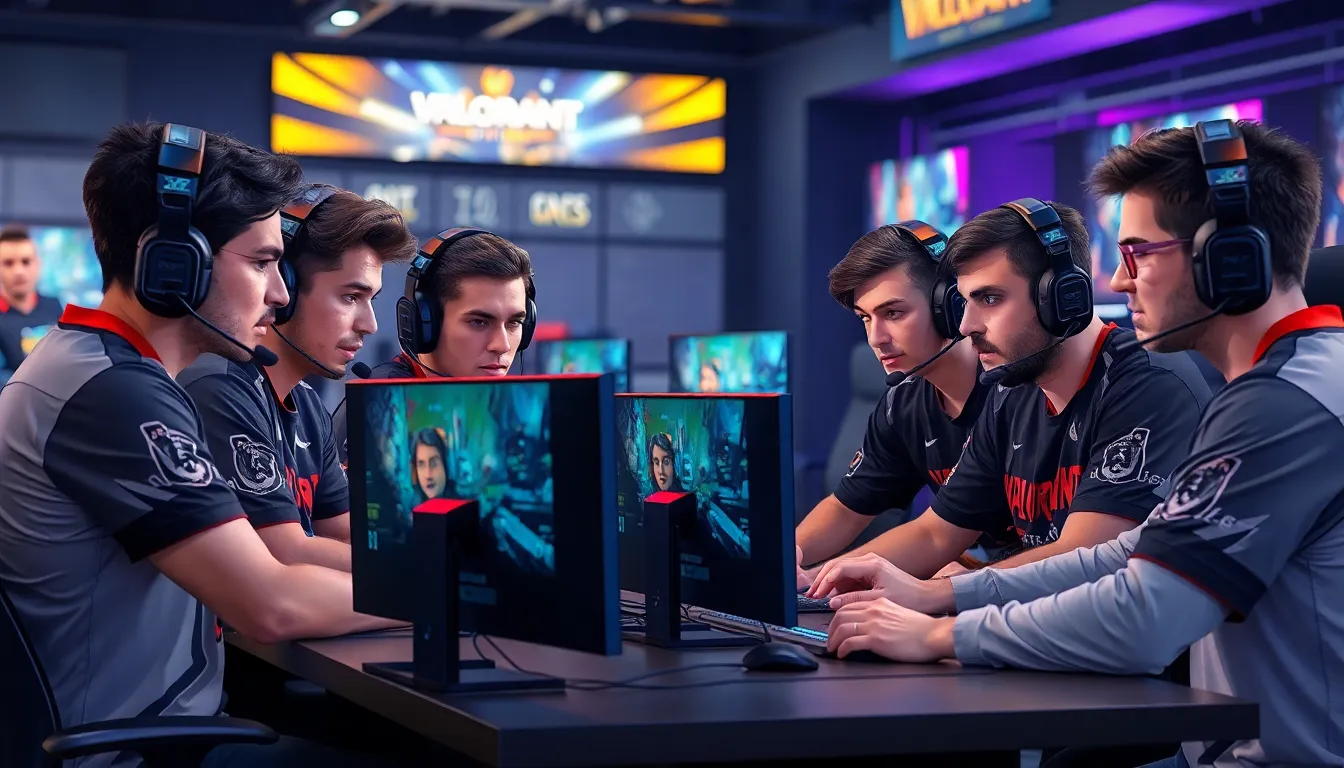In the fast-paced world of esports, Valorant teams are the rock stars of the gaming universe, blending strategy, skill, and a sprinkle of chaos. Picture this: five players, each with their own quirks and talents, coming together to outsmart opponents in a digital battleground. It’s like a heist movie, but instead of stealing diamonds, they’re capturing sites and planting spikes.
valorant esports teams
Valorant esports teams represent the pinnacle of competitive gaming, showcasing incredible skills and strategies. Each team comprises five players, each talented in unique roles such as Duelist, Controller, or Initiator. Players coordinate their efforts to control areas on maps while executing complex tactics.
Notable teams have emerged in the Valorant scene, including Team Liquid, Fnatic, and Sentinels. Team Liquid has built a reputation for versatile gameplay, while Fnatic is known for its aggressive strategies. Sentinels captivate audiences with their innovative approaches to gameplay, constantly adapting to opponents.
Tournaments like VCT (Valorant Champions Tour) and VALORANT LOCK//IN highlight the teams that excel in this competitive landscape. These events draw top-tier players, further elevating the excitement of Valorant esports. The competition is fierce, with teams striving for victory and the coveted championship titles.
Statistics show significant growth in viewership and engagement within the Valorant community. In 2023, major events attracted over 1 million concurrent viewers, illustrating the game’s rising popularity in esports. Teams invest heavily in training and development, ensuring they remain competitive.
Valorant teams often collaborate with organizations to enhance their training facilities and resources. These partnerships yield comprehensive support, including coaching staff and analytics teams. By prioritizing teamwork and synergy, they maximize their chances of success in tournaments.
Efforts in player development and scouting play crucial roles in a team’s success. Many organizations actively scout for emerging talents, aiming to discover the next star players in Valorant. Commitment to constant improvement drives teams to refine their strategies and adapt to the evolving metagame.
Popular Valorant Esports Teams

Valorant boasts several well-known esports teams that excel in competitive gameplay. Each team brings its unique strengths and strategies to the arena.
Team Liquid
Team Liquid stands as a powerhouse in the Valorant scene. Known for its strategic gameplay, the team combines exceptional individual skills with flawless teamwork. Players execute complex strategies to maintain dominance. Their strong performances in the Valorant Champions Tour (VCT) show their resilience against top-tier competitors. Popular among fans, Team Liquid gained a reputation for thrilling matches and clutch plays. Their roster includes talented individuals who specialize in various roles, enhancing their adaptability during competitions.
Sentinels
Sentinels emerged as a dominant force in Valorant esports. Through consistent top-tier performances, the team showcased its ability to stay ahead. Players coordinate seamlessly, ensuring each match demonstrates their tactical prowess. Their exceptional teamwork became evident during major tournaments like VALORANT LOCK//IN. Besides their impressive gameplay, they have built a dedicated fanbase that supports them fervently. Individual skill combined with strategic planning allows Sentinels to maintain their status as favorites at events.
Fnatic
Fnatic represents one of the most respected teams in Valorant esports. The team emphasizes a balanced approach, mixing aggressive tactics with disciplined gameplay. Their players display exceptional synergy, often outmaneuvering opponents with calculated strategies. Achievements in significant tournaments, such as the VCT, highlight their competitive edge. Fnatic’s roster boasts experienced players who adapt quickly to any game scenario. This versatility contributes to their impressive run in the esports landscape, making them a team to watch.
Key Characteristics of Successful Teams
Successful Valorant esports teams excel through several key characteristics. Effective communication and refined strategies stand at the forefront, allowing teams to coordinate their movements seamlessly during matches.
Communication and Strategy
Clear communication fosters an environment where players can share real-time information. Teams often utilize voice channels to relay critical updates about enemy positions or strategies. Consistent communication can lead to calculated plays and decisive actions. Developing a comprehensive strategy combines players’ strengths, ensuring they capitalize on opponents’ weaknesses. Thorough pre-match discussions allow teams to establish roles and tactics, enhancing overall performance. Teams that communicate openly remain adaptable, adjusting strategies mid-game to maintain an edge.
Individual Skill and Synergy
Individual skill significantly contributes to a team’s success. Players adept in their roles excel, whether developing signature moves or mastering specific agents. Exceptional performers elevate their team’s potential through individual accomplishments. Recognizing personal strengths fosters team synergy, enabling players to support one another effectively. Strong relationships built on trust and understanding result in better collaboration during tense matches. Continuous practice not only improves individual skills but also reinforces the bond between teammates, creating a cohesive unit capable of complex plays and strategies.
The Evolution of Valorant Esports Teams
Valorant esports teams have experienced rapid evolution since the game’s release. Growth in competitive Valorant has accelerated, driven by dedicated players and vibrant communities.
Growth in Competitive Scene
The competitive scene has seen increased participation, with thousands of teams forming globally. Noteworthy tournaments have attracted players from various backgrounds, contributing to a diverse player pool. Teams like Cloud9 and 100 Thieves have emerged, showcasing varied gameplay styles. New players often join established teams, creating a blend of experience and innovation. Global investment in esports has also played a critical role, leading to enhanced infrastructure and support for budding teams. Additionally, grassroots tournaments have spawned multiple amateur squads, encouraging local competitions and nurturing talent at regional levels.
Impact of Tournaments and Leagues
Tournaments and leagues significantly influence the landscape of Valorant esports. Major events, such as the Valorant Champions Tour and VALORANT LOCK//IN, attract immense viewership, generating excitement among fans and players alike. League structures provide teams with consistent opportunities to compete and refine strategies. As multiple partners join the scene, sponsorship deals offer financial support to teams, boosting growth. Furthermore, the introduction of seasonal leagues has led to sustained engagement within the community. This combination of high-stakes tournaments and structured leagues enhances the overall competitive environment and fosters the continued success of Valorant esports teams.
Conclusion
Valorant esports teams have transformed the competitive gaming landscape with their strategic depth and teamwork. The synergy among players in these teams is crucial for executing complex tactics and achieving success in high-stakes tournaments. As the esports scene continues to evolve, the importance of effective communication and individual skill cannot be overstated.
With organizations investing in player development and infrastructure, the future looks bright for Valorant teams. Their journey reflects the dedication and passion of players and fans alike. As they navigate the competitive arena, these teams will undoubtedly continue to push the boundaries of what’s possible in esports.

